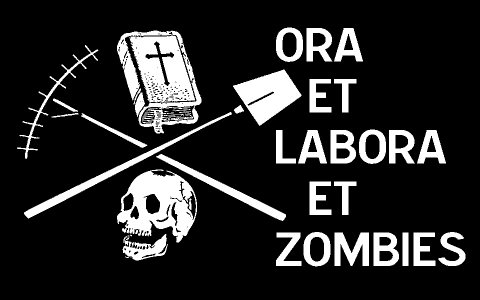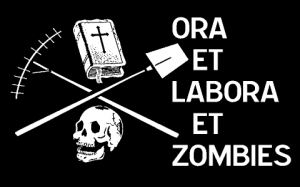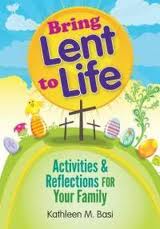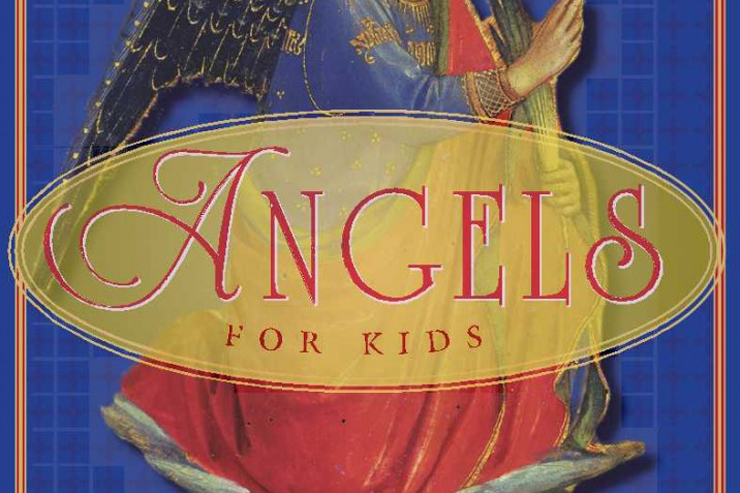Allow me to introduce you to something awesome in Catholic writing: the the man behind Labora Editions.
Ryan Charles Trusell caught my attention after everyone started raving about his Ora et Labora et Zombies after the Catholic New Media Conference in Dallas last summer. I can’t resist a good story, and one that involves actual letters arriving in the mail? Well, it sounded like love to me.
So I signed myself up for the first installment of letters.
When they arrived in a nondescript envelope in the mail, I stopped out by the highway, ripped it open, and started reading.
I’ve been waiting (rather impatiently) by my mailbox ever since, looking for each new installment as though it was really happening.
It’s made me wonder how people LIVED while Dickens was doing his serial writing!
Ryan was kind enough to agree to an interview, and I was delighted to find out he is as amazing to speak with as he is in his writing.
Ryan, tell us a little about yourself.
I grew up in Tulsa, Oklahoma, attended the University of Arkansas, was received into full communion with the Catholic Church (2009) at St. Joseph Cathedral in Baton Rouge, Louisiana, and currently reside in Houston, Texas with my beautiful wife, soon to be joined (please God) by our first baby, whom I have nicknamed Burl (because we don’t know boy or girl).
What inspired you to start writing?
Writing was something I loved all through my adolescence and early adulthood. I wrote a novel my senior year of high school and sent it off to some big New York publishers that summer, convinced that I was poised to become the next suburban literary wunderkind, but alas…to no avail. Then I just kind of let it slide for about a decade.
I have always been particularly keen on writing letters, though. On the same day every year since becoming a Catholic, I write a letter to the Pope, just to let the Holy Father know how I’m doing, and to tell him thank you for the fantastic job he does.
How did you cook up this scheme of writing a novel through letters?
As has been reported elsewhere, I started writing this story with a very specific goal: to get a lovely, nerdy, Catholic girl to fall madly in love with me. Mission accomplished. I have other goals for the story now, of course, but it was born of romantic necessity.
Have you received many death threats from people left dangling at the end of a letter? No? So I’m the first? (Kidding.) (Sort of.)
No death threats yet (not counting yours.) What I do love most about the my chosen format is exactly that sense of forced anticipation. It is something the reader must share with the characters in the story.
People go nuts waiting all week for the next episode of a favorite television show, but there is not any analogue to this in the realm of reading.
If people look forward to one of my zombie letters in their mailbox with the same enthusiasm that they look forward to the next installment of Walking Dead, then I am doing my job as well as it can be done.
What advice would you give other Catholic writers?
The advice I would give to any writer, Catholic or otherwise, is to not procrastinate and to not get distracted by the internet or other forms of news and entertainment. Set aside a time each day when you’re going to write, turn everything else off, and just do it. And write longhand on paper. Writing on a computer, you’re only a click away from your email or Facebook or a thousand other things. Plus when you write longhand it mitigates the urge to fine-tune each sentence and paragraph as you go. Get a big chunk of writing out and then go back to fix the problems.
What was the greatest challenge you faced as you worked on your book?
The biggest challenge I face in writing is that I am terrible at following the advice I have just finished giving.
Is Ora et Labora et Zombies completely written?
The story is completely written, in detail. Is each and every one of the seventy-two letters already handwritten and just waiting to be sent out? No, not yet.
Who is/are your special patron saint(s) and why?
When I was confirmed I took the name Thomas. My grandfather’s name was Thomas, who I admired greatly. The saints I had in mind were St. Thomas the Apostle (who I think gets a raw deal with all that Doubting Thomas business; after all, he was the very first to proclaim My Lord and My God, carried the Gospel to India, and died a martyr, which makes him no slouch by my lights), St. Thomas More, who was the king’s good servant but God’s first, and St. Thomas Aquinas, whose Summa Theologica I consider my Mt. Everest (though I have no idea when I’ll summit or how I’ll take a picture when I do.)
What has been the greatest blessing in all of this, for you? In all this work you do in the new evangelization, at the end of the day, what do you count as your greatest success?
My greatest success and blessing to come out of Ora et Labora et Zombies so far has simply been the opportunity to get to know some wonderful new like-minded people, and to begin to expand the scope of my little publishing enterprise, Labora Editions.
I put together a series of four essays by four different Catholic bloggers on the common theme of Advent and Christmas. Each piece was its own softbound booklet, small enough and thin enough to slip inside a Christmas card but of a quality suitable for gift-giving. These Advent pieces were the first in an ongoing micropublishing experiment that I am calling my Blog-in-Analog series.
I have read so many blog posts over the years that had real, powerful meaning for me, and yet something of the blog format remains ethereal to an ink-and-paper guy like me. These posts I enjoyed so much are nowhere to be found on my bookshelf next to other work that has been of value to me. In an effort to counteract this sometimes-sense of transience, I plan to release further essays from different Catholic bloggers in this same small format, on an ongoing basis and covering a wide variety of topics.
And anything you’d like to add…
My wife and I were discussing my zombie story as relates to the larger zombie genre (and Walking Dead in particular). I think the single biggest difference about Ora et Labora et Zombies is not that it is told from a Catholic perspective, but rather the fact that such a perspective inoculates it against despair.
In Walking Dead, the single overarching emotion is despair, pointlessness. They have turned that show from a survival story into an treatise on existentialism, whereas my story is an exercise in Christian existentialism (a la Walker Percy… maybe I should have called it Walker’s Dead) Anyway, that’s a bit rambly… but it’s a point worth making, I think, the essence of the point being that Faith is the antidote to despair.
Sarah Reinhard’s a Catholic wife, mom, and author whose nose is probably in a book if she’s not scraping something off of her shoes. Her latest book is A Catholic Mother’s Companion to Pregnancy: Walking with Mary from Conception to Baptism and she’s online at SnoringScholar.com.
Visit Sarah’s blog: http://SnoringScholar.com/
Check out her books: http://SnoringScholar.com/my-books/
Please help us in our mission to assist readers to integrate their Catholic faith, family and work. Tell your family and friends about this article using both the Share and Recommend buttons below and via email. We value your comments and encourage you to leave your thoughts below. Thank you! – The Editors















